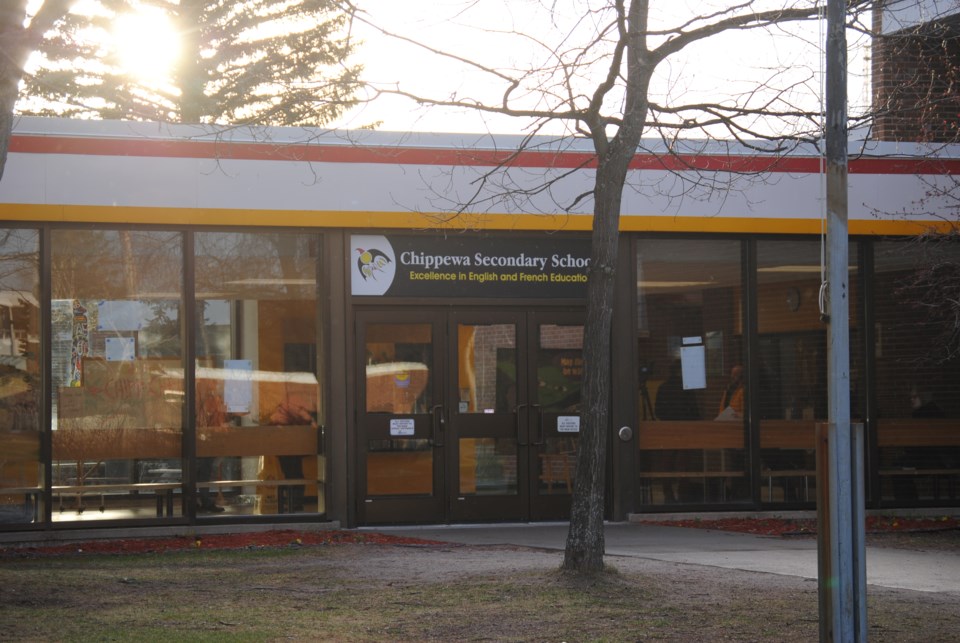Near North District School Board trustees have unanimously approved a motion to initiate the renaming and rebranding process of Chippewa Secondary School.
The trustees followed a recommendation that deemed the use of "Chippewa" and "Raider" in combination as "unacceptable." With the approval of the motion, which came during Tuesday evening's board meeting, the director of education, through the superintendent of education will now establish a naming committee to eventually make a recommendation of a new name to the Board of Trustees.
In 2017, the Board of Trustees approved the closure of Widdifield and the consolidation of the three NNDSB North Bay secondary schools into two sites, keeping West Ferris and Chippewa open and giving direction that both schools would be rebranded.
According to the report from NNDSB Superintendent Gay Smylie that accompanies the recommendation, while both Chippewa and West Ferris were originally named in that motion, the focus has shifted to the renaming and rebranding of Chippewa.
The report on Chippewa was commissioned at the request of the previous board but the current Board of Trustees is more than prepared to carry on this important step, says present Chair Erika Lougheed.
"The Board has made many commitments to truth and reconciliation, foremost, and Indigenous education," Lougheed said following the meeting. "We're in the business of education — not only with students — with the community at large, and this is part of it. It's not erasing people's sentiments about the school and the work people have done. What it's really doing is acknowledging the future and shining a bit of a light on the past, and making sure we're doing right by not only the Indigenous students in our school but of history and the truth and reconciliation call to action."
"The name 'West Ferris' is currently not an equity issue," reads the report. "West Ferris students have remained the 'Trojans' while Chippewa students are just that, Chippewa students without an identity."
The report states changing the school's name "is not a request to be taken lightly. Many emotions accompany any school and school community when it comes to making such changes."
Chippewa Secondary School opened in 1958 and has undergone many transformations over the decades while building a history of excellence in athletics, academics, arts, and activism.
"In requesting to change Chippewa’s Secondary Schools name, it is not to erase its history, but to face the history of the past and to do better in the future."
While in recent years the school's mascot was removed from use and the school's thunderbird logo is also under scrutiny as possible cultural appropriation, changing the school's nickname appeared to be the next step. The January arrival of Krista Tucker-Petrick, the school's principal, has reignited a conversation that now includes changing the school's name altogether.
Tucker-Petrick says has had "several conversations with the Indigenous lead regarding the origins of the current Thunderbird logo. The use of the thunderbird (cultural teaching with meaning and symbolism) out of any context, is appropriation. The school has unsuccessfully tried to determine how this logo came into being and has yet to locate the artist"
"One concern that keeps coming to the forefront is that Chippewa is a school with no mascot and no identity. Student council has wanted to hold spirit assemblies to teach students school cheers. However, they quickly came to realize that all the cheers that were known in the school featured the combination," of Chippewa and Raiders, according to the report. "The term Raider, especially in relation to the word Chippewa, is unacceptable."
Tucker-Petrick tells Smylie "that almost every conversation has concluded with, 'When are we going to change the school’s name?' Staff are recognizing that the name 'Chippewa,' was selected many years ago without consultation with or consideration for, the Indigenous community."
The report states, "As Chippewa strives to become a school known for social justice, they are questioning how they can move forward with an offensive
name. To be a social justice school, to have the identity of being inclusive and welcoming to all, requires examination of who they have been as they move towards who they want to be. A new name, new logo and a new mascot will support a new identity as an equity-forward school."
The process of renaming and rebranding Chippewa comes as students from the former Widdifield and W.J. Fricker schools have joined the school's population in recent years and provides an "opportunity for the three school cultures to determine together who they are," per the report. "Requests for renaming and a new mascot have come from staff and students of Widdifield, Chippewa and Fricker. No one group is asking more than any other. Instead, they are committed to becoming a space where all feel reflected and heard in the learning community."
Lougheed sees the move as an opportunity even though not all members of the community will see it that way. This provides "an exciting new future, a new mascot, a rebranding. My message for anyone who this may upset, I encourage them to lean into that feeling a little bit and seek to understand. There is lots of good literature out there about why naming things matters, especially to Indigenous peoples and what we think honours people."
The report notes First Nations are "rightsholders" rather than stakeholders in the conversation of renaming the school and selecting its mascot.
"It will require significant consultation with stakeholders, and rightsholders, bearing witness to the emotional needs of the community, addressing the past and navigating the future together. This task is necessary for all students to be part of the school and community."



